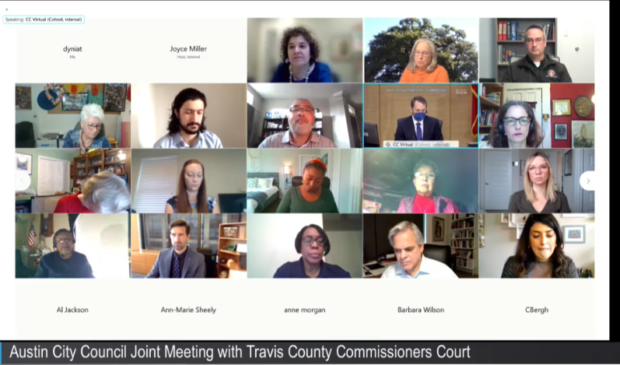Top doc Escott defends decision to vaccinate state legislators
Wednesday, January 20, 2021 by
Seth Smalley Interim Austin-Travis Health Authority Dr. Mark Escott doubled down yesterday on his conviction that state legislators should receive priority vaccinations, even if it means young and healthy lawmakers receive the vaccine ahead of more at-risk people.
Citing both the in-person legislative session and the risk of a superspreader event potentially impeding the lawmaking process, Escott said, “If we focus vaccinations on over-65-year-olds, it decreases mortality 1 to 4 percent. If we focus on individuals who are more likely to spread disease, it decreases transmission by 1 to 5 percent. The Legislature decision was made because during the legislative session, with legislators being in contact for six months, there’s the risk for a superspreading event.”
The remark was made during a joint meeting of the Austin City Council and the Travis County Commissioners Court in which public health officials discussed Covid-19 community spread and the vaccination distribution plan.
Transmission, positivity rates and hospitalizations were all slightly down from last week – a positive consequence of Stage 5 precautions – though Escott described the curve more as flattening than decreasing. Notably, rates are still hugely increased compared to those of last month, with new admissions up 76 percent and ICU bed use up 97 percent.
The percentage of Covid tests that resulted in positive ratings this week was 12.8 percent overall, down 3.4 percent from last week’s positivity rate of 16.2 percent. This marked an even greater decrease from the prior week’s rate of 16.7 percent.
“If we continue those protections, if we continue to stay home when we can, we can push this down even further like we did in the summer and hopefully ease some of those restrictions,” Escott said. “No indication now as we go into February that we will get out of Stage 5.”
Overall, 22 percent of hospital admissions in the county right now are due to Covid-19. Forty-seven percent of last week’s admissions are Caucasian, 38.2 percent are Latinx and 10.7 are African American.
Escott reminded the commissioners and Council members that the AstraZeneca vaccine is expected to receive emergency-use authorization by the end of the month.
Several commissioners had questions about widespread confusion surrounding the seemingly arbitrary vaccine dispersal methods.
Commissioner Margaret Gómez inquired about reports that numerous people outside of the 1B group – 65-plus and under-65 with a qualifying chronic medical condition – were receiving the vaccine early.
“With 350 providers, there are going to be circumstances where there are others who fall outside that group,” Escott explained. “Once you pull the vaccine up into syringes, you’ve got to use it in a short period of time – sometimes providers identify additional doses in the vial. Moderna generally has 10 doses per vial, but many of those vials had 11 or 12 doses. So at the end of the day, sometimes you have extra, and it’s our responsibility to get those doses out as quickly as possible.”
Commissioner Jeff Travillion emphasized the need for vaccine dissemination hubs to be located in vulnerable communities, while Council Member Paige Ellis asked about the new variant of the virus.
“What do we know about its transmission? Its contagiousness? Will we need a new vaccine? Can you go into more about what is and is not known about this new strain?” Ellis asked.
Though Escott didn’t directly answer the question about the vaccine’s effectiveness toward the new variant, he did affirm the new strain’s increased contagiousness, and mentioned the existence of a federal effort to detect and respond to additional new variants through genomic sequencing.
County Judge Andy Brown suggested increasing vaccine transparency through a central website that would provide information such as the number of vaccines Austin Public Health is giving out and to whom, in addition to having a platform for people to volunteer their help.
“We have some of the best tech companies in the world in Austin, and Mayor (Steve) Adler would be willing to connect us,” Brown said.
Stephanie Hayden-Howard, director of Austin Public Health, expressed openness to the idea of a centralized portal, but indicated that APH would need time to build one.
Editor’s Note: Andy Brown is on the board of the Capital of Texas Media Foundation, which is the parent nonprofit of the Austin Monitor.
The Austin Monitor’s work is made possible by donations from the community. Though our reporting covers donors from time to time, we are careful to keep business and editorial efforts separate while maintaining transparency. A complete list of donors is available here, and our code of ethics is explained here.
You're a community leader
And we’re honored you look to us for serious, in-depth news. You know a strong community needs local and dedicated watchdog reporting. We’re here for you and that won’t change. Now will you take the powerful next step and support our nonprofit news organization?











